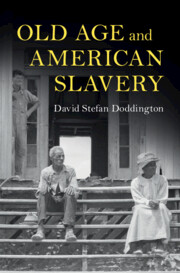Book contents
- Old Age and American Slavery
- Cambridge Studies on the American South
- Old Age and American Slavery
- Copyright page
- Dedication
- Contents
- Figures
- Tables
- Acknowledgments
- Introduction
- Part I The Enslaved
- Part II Enslavers
- 7 “Old God damn son-of-a-bitch, she gone on down to hell”
- 8 “They are getting too old and weak”
- 9 “Something must be done with the old man”
- 10 “Let our women and old men … be disabused of the false and unfounded notion that slavery is sinful”
- Conclusion
- Bibliography
- Index
10 - “Let our women and old men … be disabused of the false and unfounded notion that slavery is sinful”
Emancipation Contested
from Part II - Enslavers
Published online by Cambridge University Press: 27 October 2023
- Old Age and American Slavery
- Cambridge Studies on the American South
- Old Age and American Slavery
- Copyright page
- Dedication
- Contents
- Figures
- Tables
- Acknowledgments
- Introduction
- Part I The Enslaved
- Part II Enslavers
- 7 “Old God damn son-of-a-bitch, she gone on down to hell”
- 8 “They are getting too old and weak”
- 9 “Something must be done with the old man”
- 10 “Let our women and old men … be disabused of the false and unfounded notion that slavery is sinful”
- Conclusion
- Bibliography
- Index
Summary
Intergenerational disputes shaped by white southerners’ hopes to profit from slavery did not end with the death of an enslaver. These contests became particularly virulent when the matter revolved around posthumous manumissions, and this chapter shows how elderly enslavers who sought to emancipate enslaved people in wills had their actions challenged by rivals who utilized the discourse that conflated old age with weakness, both of body and mind, to diminish their reputation and deny their mastery. The aging process had public and political ramifications in a slave society built on dominance and mastery, and a focus on emancipation and age serves as a fitting end to this study which underlines the wider importance of age as a vector of power in the antebellum south. Contests over emancipations underscore how far understandings of aging as a period of declining force led to conflict between white southerners looking to rise at another’s expense. White enslavers looked to their aged peers who sought to free their slaves as reduced in authority and status, and as figures whose claims to mastery must be usurped for the good of both private and public interests associated with slavery.
Keywords
- Type
- Chapter
- Information
- Old Age and American Slavery , pp. 318 - 345Publisher: Cambridge University PressPrint publication year: 2023

